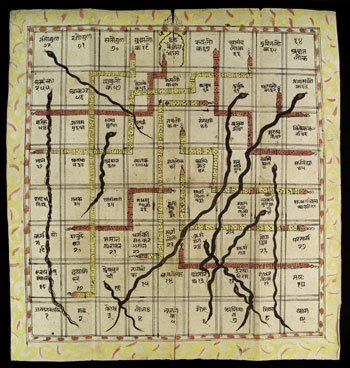Another in the series of artifacts that Rebecca Commisso is going to make is a Snakes and Ladders game. (See the post from Wednesday, July 17, 2009 to see her brochure and why she is making these things.) :
 I chose the medium of the board game because I saw a Bingo-style game in the Careers course textbook entitled “Bingo for Life”. In this game, the students randomly assign numbers to a variety of life choices or trajectories, such as being a single parent, going to university and traveling the world. The caller then calls out the numbers, as in traditional Bingo, and when the student gets a line, the “choices” are put together to form the picture of the future life of the player. The message of this game, as indicated by the reflection exercise intended to be done after the game is played, is that leaving life to chance is not a good idea.
I chose the medium of the board game because I saw a Bingo-style game in the Careers course textbook entitled “Bingo for Life”. In this game, the students randomly assign numbers to a variety of life choices or trajectories, such as being a single parent, going to university and traveling the world. The caller then calls out the numbers, as in traditional Bingo, and when the student gets a line, the “choices” are put together to form the picture of the future life of the player. The message of this game, as indicated by the reflection exercise intended to be done after the game is played, is that leaving life to chance is not a good idea.
This message is problematic because it assumes that most things which influence an individual’s options are choices, and not luck. But many things which are rewarded in the world of work and school are not governed by choices. Even in the game, it is not clear which of the items is a choice and which just happens to a person. For example, is it poor planning or poor luck to be a single parent? Is it even correct to assume that there is a problem with being a single parent at all?
Here is the scheme:
Snakes and Ladders
|
|  |
|  | This late 18th century snakes and ladders board was then known as the game of Heaven and Hell (Jnana Bagi).The longest ladder reaches from square 17 'Compassionate Love' to 69 'The World of the Absolute'. |
The board game will advance, as does the original game, based on the roll of a die, and players will land on “Snakes”, which will give them disadvantages in their careers, and “Ladders”, which will give them advantages. As in life, these events are entirely random, although the fact that any particular event is a snake rather than a ladder is based on the inequities of our society.Snakes
Your parents are so busy with their poorly paid part time jobs that they cannot help you with your homework.
You have a mental illness that goes undiagnosed until your thirties.
Your professional credentials are from a country other than the US or Canada.
Your professional education finishes just when an unexpected slump in the job market occurs in your chosen career. Poor planning on your part!
Your cultural background makes it difficult for you to ask the teacher for help, so you end up looking lazy and not very bright.
You come to school tired and afraid after watching your Dad beat the crap out of your Mum the night before.
The manners that your culture has taught you inadvertently rub your boss the wrong way, which prevents your skills from being recognized in the work place.
You spend your twenties and thirties raising your children.
Your parents become ill in your fifties and you are the only one to care for them.
About five years before you are eligible to retire, your plant closes down. You have to start school all over again.
You are born with a disability.
Ladders
Your parents were both educated in a Canadian university.
You are able to perform complex but inherently meaningless tasks well, such as quadratic equations and five paragraph essays, which gives you a real advantage in your education.
“School” skills, such as text interrogation, are practiced regularly in your home, so it is easy for you.
You are fluent in the Queen’s English, and can pick up quickly on the jargon of any workplace.
Your cultural background gives you the unearned ability to impress your teachers with your intelligence and good manners.
Your parents are both teachers and can advocate on your behalf throughout your educational career.
A perceptive teacher or boss recognizes your potential and takes you under her wing.
You are able-bodied and healthy, attractive and either white or able to “pass” for white by virtue of your speech, dress and deportment.






















